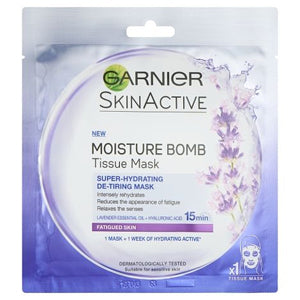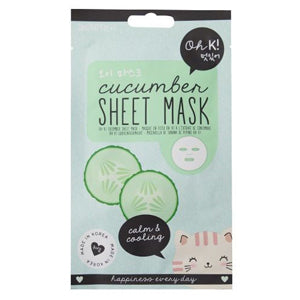Face masks for dry skin
Having soft skin and a dewy complexion is often associated with youth and healthy skin. Dry skin can either be mild or severe, and can often make someone self-conscious about their appearance. On this page, we'll discuss the causes of dry skin, the best skin care routine for dry skin and the benefits of using face masks. We will also cover some frequently asked questions on face masks for dry skin.
Click on a link below to jump to that section:
- What causes dry skin on the face?
- How to treat dry skin
- The best skin care routine for dry skin
- How do face masks for dry skin work?
- Recommended face masks for dry skin
- How to apply a face mask for dry skin
- How often should you use a face mask for dry skin?
- Face masks for dry skin FAQs
What causes dry skin on the face?
Usually, dry skin on the face isn't serious. In these cases, it is often caused by hot or cold weather, moisture or hot water. Cold weather can often aggravate the skin further, leading to irritation, redness and dehydration. Dry skin can also be genetic, as some people can be born with less oil-producing glands. The following factors can also cause dry skin in some people:
Lifestyle factors
Lifestyle factors can affect the health of your skin and cause dry skin. Factors that can put a strain on your overall health, such as a lack of sleep and experiencing stress can cause dry skin. Stress can cause your hormones to go out of balance, whereas adrenaline from stress and anxiety can cause sweat, which causes water loss. Not getting enough sleep can cause your skin's PH level to change, causing your skin to become very dry.
Not drinking enough water is another common cause of dry skin. Becoming dehydrated can irritate the skin, drying it out and altering its tone. Not following a healthy diet can also cause the skin to become extremely dry and irritated. Common culprits for causing dry skin include alcohol, salty food, sugar, refined carbohydrates and drinking an excessive amount of coffee.
Certain products and chemicals
Using products on your face that contain harsh chemicals can cause your skin to become dry, as they can strip skin of their moisture. Ensure your skin products don't list alcohol or retinoids as main ingredients. Although retinoids are known for treating conditions such as wrinkles and acne, they are too harsh for most people with dry skin. You should also avoid over-exfoliating.
Frequent exposure to chlorine and hot environments are other common causes of dry skin. Chlorine is a harsh chemical that can cause skin damage and irritation after extensive contact. Too much heat can also cause dry skin, as it leads to sweating. This water loss can cause the skin to lose its moisture.
Health conditions
The following health conditions can sometimes cause dry skin on the face:
- Dermatitis.
- Eczema.
- Certain medications can make the skin dry. This includes blood pressure and antihistamines when taken long term. Diuretics such as hydrochlorothiazide or furosemide, Retin-A and cholesterol medication can also cause dry skin.
How to treat dry skin

Serious conditions or situations where the skin is extremely dry require the help of a dermatologist for professional advice. If you are worried about your dry skin, or if your dry skin is painful, you should contact your GP or a dermatologist for guidance.
Milder cases of dry skin can normally be treated with various lifestyle changes. This includes the following:
- Drink the recommend amount of water per day. Health authorities recommend drinking eight 8-ounce glasses, which equals about 2 liters, per day.
- Avoid applying harsh chemicals to the face and over-exfoliating.
- Avoid unnecessary exposure to chlorine and heat.
- Follow a healthy, balanced diet.
- Try and reduce stress as much as possible.
When your dry skin isn't serious, the following ideal skin care routine can help improve the condition.
The best skin care routine for dry skin
A good skin care routine for dry skin should include the following vital stages:
Cleanse your skin daily with a cleanser designed for sensitive skin.
Cleansers are useful for removing any makeup, as well as boosting radiance and preparing your skin for the rest of your skin care routine. If you have dry skin, it is recommended to use a cleanser that is ideal for sensitive skin to avoid skin damage or irritation. Cream cleansers are recommended, as they are gentle on the skin.
You can shop our range of cleansers here.
Exfoliate skin once a week to get rid of dead skin cells and dirt.
If you have severe acne and rosacea, you should skip exfoliation, as it could inflame the skin even more. If you suffer from severe blackhead breakouts, you should also avoid exfoliating unless a GP has advised a product. However, if you have dry skin with no serious skin condition, we recommend using a chemical exfoliator in the form of a cream or serum. Never use a physical exfoliator on dry skin. Physical exfoliators are typically grainy, like sugar cubes. They also require a great deal of scrubbing, which can irritate dry skin.
Chemical exfoliators are acids in the form of a liquid, and are often hidden inside a serum or cream. Choosing a chemical exfoliator that includes glycolic acid will help remove any dead skin cells that are sitting on the edge of the skin. This will encourage healthy and soft skin turnover.
The key to effective exfoliation is to avoid over-exfoliating. If you have dry skin, you should only use a small amount of an exfoliating product until your skin becomes used to it.
Apply a face mask three times a week.
Gentle, hydrating face masks are a vital part of a skin care routine for dry skin. Always avoiding applying harsh face masks on dry skin. You should look for a face mask that features humectants, which are ingredients that are found in products that hydrate the skin. These ingredients hold onto water.
We will explain more about humectants and face masks for dry skin below.
Moisturise daily in the morning and evening.
Choose a moisturiser that leaves skin feeling plump and nourished. Using a deep, rich moisturiser will provide maximum hydration, ensuring your skin is getting the care it needs. A moisturiser with a thick ointment can help you lock in moisture. If you have sensitive skin, ensure your moisturiser states it is suitable for use on sensitive skin.
You can shop our range of moisturisers here.

How do face masks for dry skin work?
Face masks for dry skin work by delivering a burst of nourishing and therapeutic skin care ingredients to hydrate the skin. As face masks cover your skin with a formula for a set amount of time, this gives the ingredients more time to penetrate the surface.
Face masks containing humectants are designed especially for treating dry skin. Humectants are designed to attract moisture from their environment, which can be the outside air or the underlying layers of your skin. Humectants that are commonly found in face masks for dry skin include hyaluronic acid, glycerin, honey, and aloe vera.
Other ingredients that are effective for dry skin include vitamin E, avocado, ceramides, urea and plant oils and butters.
Recommended face masks for dry skin
Garnier Moisture Bomb Tissue Mask
- Hydrating formula
- Reduces the appearance of fine lines
- Enriched with hyaluronic acid & pomegranate
- Paraben-free formula
- Suitable for use on sensitive skin
- Ultra-thin mask
- Works in just 15 minutes

Price: €4.50
Nivea Q10+ Vit C Energy Sheet Mask
- Ideal for dry & combination skin
- Suitable for sensitive skin
- Suitable for Vegans
- Not tested on animals

Price: €5.00
Oh k! Cucumber Sheet Mask
- Contains cucumber, chamomile and aloe vera extracts
- Cools and calms
- Locks in moisture

Price: €6.50
How to apply a face mask for dry skin
You should always use a cleanser before applying a face mask. After this, ensure you follow these steps to apply a face mask correctly:
- Apply the face mask in a thin, even layer around your whole face. You should avoid the eyes and lips when applying your face mask.
- Wait five to twenty minutes, depending on the advice provided on the face mask instructions. Hydrating masks for dry skin and sometimes left on longer than this, and sometimes should even be left on overnight. Ensure you read the instructions beforehand to avoid leaving the face mask on for too long.
- If you are using a rinse-off face mask, rinse with warm water. You can use a gentle wash cloth for this if you find this process easier. If your face mask is designed to be peeled off, ensure you do this gently to prevent irritation to the skin.
- Always follow this process with a moisturiser.

How often should you use a face mask for dry skin?
Using a face mask for dry skin too often can make your dry skin worse. You should use a gentle hydrating face mask 3 times a week. Ensure the face mask you are using is designed for dry skin, as using a face mask that dries the skin out can also make the skin worse.
Face masks for dry skin FAQs
Is lukewarm water ideal for face masks?
Lukewarm water is ideal for rinsing face masks that are designed to be removed with water. We recommend avoiding using water that is too hot, as this creates a risk of burning and damaging the skin.
Can you have a peel face mask with dry skin?
Many face masks that are designed for dry skin are peel-off face masks. Providing you follow the instructions correctly, there is nothing wrong with using peel-off face masks for dry skin.
When is the best time to use a face mask for dry skin?
Before using a face mask, you should always first use a cleanser on your face. If your face mask is supposed to be left on overnight, apply it as the last step in your nighttime skin care routine.
Is vitamin C ideal for dry skin?
Vitamin C face products are ideal for brightening the skin, and are specially ideal for dull skin that is dry and lacks moisture. However, those with sensitive skin may have allergies or redness from using vitamin C. If you have very sensitive skin, we recommend avoiding vitamin C face products. If your skin tends to slightly sensitive, you should start with a lower concentration. You should also test the product on an area of your skin for any allergies before applying to the face.
Related content

